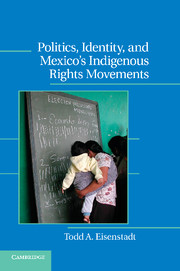Book contents
- Frontmatter
- Contents
- List of Tables and Figures
- Preface and Acknowledgments
- 1 SURVEYING THE SILENCE
- 2 A TALE OF TWO MOVEMENTS
- 3 INDIVIDUAL AND COMMUNITARIAN IDENTITIES IN INDIGENOUS SOUTHERN MEXICO
- 4 AGRARIAN CONFLICT, ARMED REBELLION, AND THE STRUGGLE FOR RIGHTS IN CHIAPAS' LACANDON JUNGLE
- 5 CUSTOMARY PRACTICES, WOMEN'S RIGHTS, AND MULTICULTURAL ELECTIONS IN OAXACA
- 6 FROM BALACLAVAS TO BASEBALL CAPS
- 7 RECONCILING INDIVIDUAL RIGHTS, COMMUNAL RIGHTS, AND AUTONOMY INSTITUTIONS
- Bibliography
- Index
- Titles in the series
3 - INDIVIDUAL AND COMMUNITARIAN IDENTITIES IN INDIGENOUS SOUTHERN MEXICO
A THEORETICAL AND STATISTICAL FRAMEWORK
Published online by Cambridge University Press: 04 April 2011
- Frontmatter
- Contents
- List of Tables and Figures
- Preface and Acknowledgments
- 1 SURVEYING THE SILENCE
- 2 A TALE OF TWO MOVEMENTS
- 3 INDIVIDUAL AND COMMUNITARIAN IDENTITIES IN INDIGENOUS SOUTHERN MEXICO
- 4 AGRARIAN CONFLICT, ARMED REBELLION, AND THE STRUGGLE FOR RIGHTS IN CHIAPAS' LACANDON JUNGLE
- 5 CUSTOMARY PRACTICES, WOMEN'S RIGHTS, AND MULTICULTURAL ELECTIONS IN OAXACA
- 6 FROM BALACLAVAS TO BASEBALL CAPS
- 7 RECONCILING INDIVIDUAL RIGHTS, COMMUNAL RIGHTS, AND AUTONOMY INSTITUTIONS
- Bibliography
- Index
- Titles in the series
Summary
A debate currently rages in academia about identity formation and, more specifically, how much agency one has over the existence and nature of one's own ethnic identity. The contemporary generation of ethnic-conflict scholars who come from a rational-choice tradition (Hardin 1995; Lichbach 1994; Fearon and Laitin 2003; Chandra 2004) are to some degree, at least, proponents of an instrumentalist theory under which individuals are constantly making choices (consciously or subconsciously) about when to emphasize, for example, an Indian versus a peasant identity. This understanding is very much at odds with anthropologists' and collective studies scholars' primordialists claims (Geertz 1973; Escárzaga and Gutiérrez 2005; Gossen 1994) that ethnic identity is inherent and central. Primordialists argue ethnicity is at the core of individuals' decision-making behavior, particularly in indigenous cultures like those of southern Mexico. In the middle position are the constructivists, who believe in the malleability of ethnic identities, but within a constrained domain of possibilities.
Up until now, there has been little individual-level primary data gathered about identity formation that could inform the debate. This book is among the first to marshal empirical, quantifiable evidence for the claim that external factors (such as state built corporatist institutions) are more influential in individuals' political and economic decisions than either endogenous ethno-cultural identities or a movement's organization and structure.
- Type
- Chapter
- Information
- Publisher: Cambridge University PressPrint publication year: 2011
- 1
- Cited by



